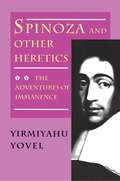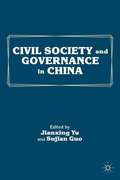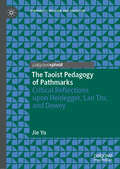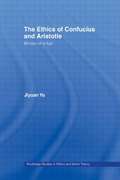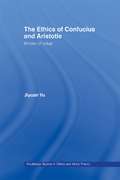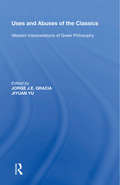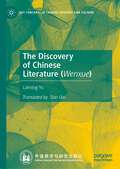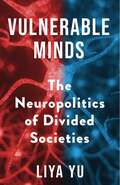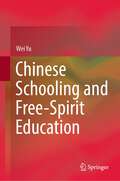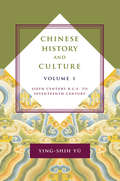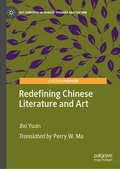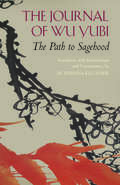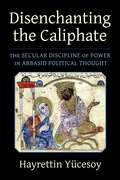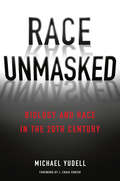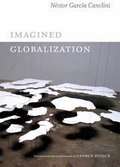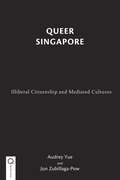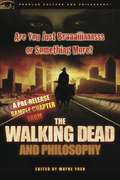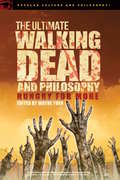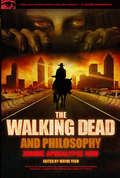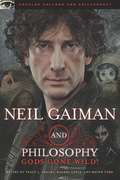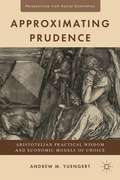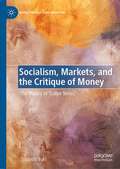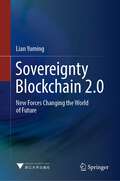- Table View
- List View
Spinoza and Other Heretics, Volume 2: The Adventures of Immanence
by Yirmiyahu YovelThis ambitious study presents Baruch Spinoza (1632-1677) as the most outstanding and influential thinker of modernity—and examines the question of whether he was the "first secular Jew." A number-one bestseller in Israel, Spinoza and Other Heretics is made up of two volumes—The Marrano of Reason and The Adventures of Immanence. Yirmiyahu Yovel shows how Spinoza grounded a philosophical revolution in a radically new principlethe philosophy of immanence, or the idea that this world is all there is—and how he thereby anticipated secularization, the Enlightenment, the disintegration of ghetto life, and the rise of natural science and the liberal-democratic state.In The Adventures of Immanence, Yovel discloses the presence of Spinoza's philosophical revolution in the work of later thinkers who helped shape the modern mind. He claims it is no accident that some of the most unorthodox and innovative figures in the past two centuries—including Goethe, Kant, Hegel, Heine, Marx, Nietzsche, Freud, and Einstein—were profoundly influenced by Spinoza and shared his view that immanent reality is the only source of valid social and political norms and that recognizing this fact is necessary for human liberation. But what is immanent reality, and how is liberation to be construed? In a work that constitutes a retelling of much of Western intellectual history, Yovel analyzes the rival answers given to these questions and, in so doing, provides a fresh view of a wide range of individual thinkers.
Civil Society And Governance In China
by Jianxing Yu Sujian GuoWritten by scholars from both inside and outside China, this wide-ranging collection of essays explores the complexity of the relationship between governance and civil society by combining theoretical exploration and empirical case studies based on the governance practice in China.
The Taoist Pedagogy of Pathmarks: Critical Reflections Upon Heidegger, Lao Tzu, And Dewey (Spirituality, Religion, and Education)
by Jie YuBased on the intertwined complex conversations among Heidegger, Dewey, and Lao Tzu, this book explores the possibilities of the Taoist Pedagogy of Pathmarks as a clearing between truth and untruth, responding to the spiritual call of Tao as inaction and teaching as releasement. In this book, Yu provides a critical exploration of the rich dynamics in the “direct” conversations among the three great thinkers of east and west, highlighting the implications of their ideas for education throughout. As more educational researchers, teacher educators, and teachers recognize the limitations of didactic teaching-as-telling, the author brings an alternate pathway to light.
The Ethics of Confucius And Aristotle: Mirrors of Virtue
by Jiyuan YuFurthermore, this work focuses on singling out the most significant issues which not only are commonly exploited in these two ethics, but are also of great interest in contemporary virtue ethics. I first became interested in this subject in 1996 when Nicholas Bunnin invited me to speak at a conference on Chinese philosophy that he organized at Oxford University. By that time, Aristotle’s Nicomachean Ethics had been intensively studied as the most important model of virtue ethics for decades. As a student of Aristotle, when I turned my eyes to Chinese philosophy, the first thing I noticed is how similar the Confucian approach to ethics is to Aristotle’s in many aspects. Hence I chose to present a paper dealing with how Aristotle and Confucius conceive the conception of virtue. The paper was later published in the Philosophy East and West 48 (1998), with the title of ‘‘Virtue: Aristotle and Confucius.’’ It became the seed of this book.
The Ethics of Confucius and Aristotle: Mirrors of Virtue (Routledge Studies in Ethics and Moral Theory #7)
by Jiyuan YuAs a comparative study of the virtue ethics of Aristotle and Confucius, this book explores how they each reflect upon human good and virtue out of their respective cultural assumptions, conceptual frameworks, and philosophical perspectives. It does not simply take one side as a framework to understand the other; rather, it takes them as mirrors for each other and seeks to develop new readings and perspectives of both ethics that would be unattainable if each were studied on its own.
Uses and Abuses of the Classics: Western Interpretations of Greek Philosophy
by Jiyuan YuFrom very early on, Western philosophers have been obsessed with the understanding of a relatively few works of philosophy which have played a disproportionately large and fundamental role in developing the Western philosophical canon, dominating the curriculum in the past and in the present; there is no indication that they will not do so in the future. Uses and Abuses of the Classics examines the various ways in which the different periods of the history of philosophy have approached these texts. The editors have chosen for analysis some of the major philosophers from periods of the history of philosophy in which the interpretation of the classics has been particularly significant. Contributions to this book include entries on: Aristotle's reading of Plato; Averroes on Aristotle; Nietzsche on the Beginnings of Western Philosophy; and Thomas Aquinas's Commentary on Aristotle's Metaphysics.
The Discovery of Chinese Literature (Key Concepts in Chinese Thought and Culture)
by Laiming YuThis book traces the origin and evolvement of two Chinese characters “wenxue”(literature) by using the methods of conceptual history and historical and cultural semantics, and by taking the evolution and changes of the concept of the these two characters and their interpretations in the west as a window, and re-examining the contemporary morphology of concept evolution in the historical context of concept generation and development to discover the historical and cultural connotations hidden behind the characters, so as to embark on a vivid journey to explore the history of literary thought, discipline and culture. The entire book is woven with the concept of “literature” at its core. Following the author's analysis and interpretation, an interlocking and orderly network of description of ancient and modern, Chinese and foreign unfolds. In this context, the chapters are progressive and mutually responsive, forming an organic whole which is connected at the beginning and the end. For those readers who are trying to understand how Chinese “wenxue” evolved from one of the “four disciplines of Confucius” into a modern discipline and concept, this book will provide the most detailed, in-depth, and vivid historical picture.
Vulnerable Minds: The Neuropolitics of Divided Societies
by Liya YuNeuroscience research has raised a troubling possibility: Could the tendency to stigmatize others be innate? Some evidence suggests that the brain is prone to in-group and out-group classifications, with consequences from ordinary blind spots to full-scale dehumanization. Many are inclined to reject the argument that racism and discrimination could have a cognitive basis. Yet if we are all vulnerable to thinking in exclusionary ways—if everyone, from the most ardent social-justice advocates to bigots and xenophobes, has mental patterns and structures in common—could this shared flaw open new prospects for political rapprochement?Liya Yu develops a novel political framework that builds on neuroscientific discoveries to rethink the social contract. She argues that our political selves should be understood in terms of our shared social capacities, especially our everyday exclusionary tendencies. Yu contends that cognitive dehumanization is the most crucial disruptor of cooperation and solidarity, and liberal values-based discourse is inadequate against it. She advances a new neuropolitical language of persuasion that refrains from moralizing or shaming and instead appeals to shared neurobiological vulnerabilities. Offering practical strategies to address those we disagree with most strongly, Vulnerable Minds provides timely guidance on meeting the challenge of including and humanizing others.
Chinese Schooling and Free-Spirit Education
by Wei YuReaching deep into the wealth of Chinese philosophical wisdom, this book offers rich insights into a way of educating that has found staunch advocates among educators through the ages. The ‘free-spirit education’, which calls on educators to respect and nurture the natural goodness of each child, affords an educational principle that is embedded in one of the most important Confucian classics: The Doctrine of the Mean. This book analyzes the meaning, history, principles, and educational application of ‘free-spirit education’ and also explores its contemporary development in the context of a school improvement initiative. It introduces the intellectual origins of ‘free-spirit education’, the application in ’process-based inductive teaching’ and cases from the field. It presents the collection of pedagogical cases that are rooted in the traditions of Chinese philosophic inquiry and viewed through the lens of contemporary pedagogy for human development. This book is a useful reference for university faculty, educational researchers, school teachers and leaders, graduate and undergraduate students in curriculum studies and in philosophy, social science, and education, curriculum developers, and all those educators who are interested in understanding ‘free-spirit education’—a key component of the humanistic traditions of Chinese education.
Chinese History and Culture: Sixth Century B.C.E. to Seventeenth Century, Volume 1 (Masters of Chinese Studies)
by Ying-Shih YüThe recipient of the Kluge Prize for lifetime achievement in the humanities and the Tang Prize for "revolutionary research" in Sinology, Ying-shih Yü is a premier scholar of Chinese studies. Chinese History and Culture volumes 1 and 2 bring his extraordinary oeuvre to English-speaking readers. Spanning two thousand years of social, intellectual, and political change, the essays in these volumes investigate two central questions through all aspects of Chinese life: what core values sustained this ancient civilization through centuries of upheaval, and in what ways did these values survive in modern times?From Yü Ying-shih's perspective, the Dao, or the Way, constitutes the inner core of Chinese civilization. His work explores the unique dynamics between Chinese intellectuals' discourse on the Dao, or moral principles for a symbolized ideal world order, and their criticism of contemporary reality throughout Chinese history. Volume 1 of Chinese History and Culture explores how the Dao was reformulated, expanded, defended, and preserved by Chinese intellectuals up to the seventeenth century, guiding them through history's darkest turns. Essays incorporate the evolving conception of the soul and the afterlife in pre- and post-Buddhist China, the significance of eating practices and social etiquette, the move toward greater individualism, the rise of the Neo-Daoist movement, the spread of Confucian ethics, and the growth of merchant culture and capitalism. A true panorama of Chinese culture's continuities and transition, Yü Ying-shih's two-volume Chinese History and Culture gives readers of all backgrounds a unique education in the meaning of Chinese civilization.
Redefining Chinese Literature and Art (Key Concepts in Chinese Thought and Culture)
by Jixi YuanThis Key Concepts pivot discusses the significance of the ancient Chinese concept of xìng or ‘Association’ in defining Chinese civilization and thought through the centuries. An approach unique to literary creation in China, xìng highlights the importance Chinese civilization sets by the integration of intellect, emotion and will into a highly consistent concept across its personal and public spheres. The book explores how the concept has been a widely used creative technique even in the earliest collections of Chinese poems, using metaphor and symbolism to set the scene and indicate thoughts and emotions invested in the vehicle of metaphor, as well as its impact on Chinese literature and philosophy as a domain of multiple meanings in classical Chinese aesthetics.
The Journal of Wu Yubi: The Path to Sagehood (Hackett Classics)
by Wu Yubi Theresa KelleherIn this rare firsthand account of an individual's pursuit of sagehood, the early Ming dynasty scholar and teacher Wu Yubi chronicles his progress and his setbacks, as he strives to integrate the Neo-Confucian practices of self-examination and self-cultivation into everyday life. In more than three hundred entries, spanning much of his adult life, Wu paints a vivid picture, not only of the life of the mind, but also of the life of a teacher of modest means, struggling to make ends meet in a rural community.This volume features M. Theresa Kelleher's superb translation of Wu's journal, along with translations of more than a dozen letters from his personal correspondence. A general Introduction discusses Neo-Confucianism and the Ming dynasty, and includes biographical information that puts the main work in context. A substantial commentary on the journal discusses the obstacles and supports Wu encounters in pursuit of his goal, the conflict between discipline and restraint of the self and the nurturing and expanding of the self, Wu's successes and failures, and Wu’s role as a teacher.Also included are a map of the Ming dynasty, a pronunciation guide, a chronology of Chinese dynasties, a glossary of names, a glossary of book titles, and suggestions for further reading.
Disenchanting the Caliphate: The Secular Discipline of Power in Abbasid Political Thought (Columbia Studies in International and Global History)
by Hayrettin YücesoyThe political thought of Muslim societies is all too often defined in religious terms, in which the writings of clerics are seen as representative and ideas about governance are treated as an extension of commentary on sacred texts. Disenchanting the Caliphate offers a groundbreaking new account of political discourse in Islamic history by examining Abbasid imperial practice, illuminating the emergence and influence of a vibrant secular tradition.Closely reading key eighth-century texts, Hayrettin Yücesoy argues that the ulema’s discourse of religious governance and the political thought of lay intellectuals diverged during this foundational period, with enduring consequences. He traces how notions of good governance and reflections on prudent statecraft arose among cosmopolitan literati who envisioned governing as an art. Competent in nonreligious branches of knowledge and trained in administrative professions, these belletrists articulated and defended secular political practices, reimagining the caliphal realm as politically constituted rather than natural. They sought to improve administrative efficiency and bolster state control for an empire made up of diverse cultures. Their ideas about moral cultivation, temporal reasoning, and governmental rationality endured for centuries as a counterpoint to religious rulership. Drawing on this history, Yücesoy critiques the concept of “Islamic political thought,” calling for decolonizing debates about “secular” and “religious” politics.Theoretically rich and historically grounded, Disenchanting the Caliphate is an insightful and provocative reconsideration of key strands of political discourse in the intellectual history of Muslim societies.
Race Unmasked: Biology and Race in the Twentieth Century (Race, Inequality, and Health #6)
by Michael YudellRace, while drawn from the visual cues of human diversity, is an idea with a measurable past, an identifiable present, and an uncertain future. The concept of race has been at the center of both triumphs and tragedies in American history and has had a profound effect on the human experience. Race Unmasked revisits the origins of commonly held beliefs about the scientific nature of racial differences, examines the roots of the modern idea of race, and explains why race continues to generate controversy as a tool of classification even in our genomic age.Surveying the work of some of the twentieth century's most notable scientists, Race Unmasked reveals how genetics and related biological disciplines formed and preserved ideas of race and, at times, racism. A gripping history of science and scientists, Race Unmasked elucidates the limitations of a racial worldview and throws the contours of our current and evolving understanding of human diversity into sharp relief.
Race Unmasked
by Michael YudellExploring the role of science in the making of America's modern racial calculus.
Race Unmasked
by Michael YudellExploring the role of science in the making of America's modern racial calculus.
Imagined Globalization
by George Yúdice Néstor García CancliniA leading figure in cultural studies worldwide, Néstor García Canclini is a Latin American thinker who has consistently sought to understand the impact of globalization on the relations between Latin America, Europe, and the United States, and among Latin American countries. In this book, newly available in English, he considers how globalization is imagined by artists, academics, migrants, and entrepreneurs, all of whom traverse boundaries and, at times, engage in conflicted or negotiated multicultural interactions.García Canclini contrasts the imaginaries of previous migrants to the Americas with those who live in transnational circuits today. He integrates metaphor and narrative, working through philosophical, anthropological, and socioeconomically grounded interpretations of art, literature, crafts, media, and other forms of expression toward his conclusion that globalization is, in important ways, a collection of heterogeneous narratives. García Canclini advocates global imaginaries that generate new strategies for dealing with contingency and produce new forms of citizenship oriented toward multiple social configurations rather than homogenization. This edition of Imagined Globalization includes a significant new introduction by George Yúdice and an interview in which the cultural theorist Toby Miller and García Canclini touch on events including the Arab Spring and Occupy Wall Street.
Queer Singapore: Illiberal Citizenship and Mediated Cultures
by Audrey Yue Jun Zubillaga-PowSingapore remains one of the few countries in Asia that has yet to decriminalise homosexuality. Yet it has also been hailed by many as one of the emerging gay capitals of Asia. This book accounts for the rise of mediated queer cultures in Singapore's current milieu of illiberal citizenship. This collection analyses how contemporary queer Singapore has emerged against a contradictory backdrop of sexual repression and cultural liberalisation. Using the innovative framework of illiberal pragmatism, established and emergent local scholars and activists provide expansive coverage of the impact of homosexuality on Singapore's media cultures and political economy, including law, religion, the military, literature, theatre, photography, cinema, social media and queer commerce. It shows how new LGBT subjectivities have been fashioned through the governance of illiberal pragmatism, how pragmatism is appropriated as a form of social and critical democratic action, and how cultural citizenship is forged through a logic of queer complicity that complicates the flows of oppositional resistance and grassroots appropriation.
Are You Just Braaaiiinnnsss or Something More?
by Wayne YuenIn Are You Just Braaaiiinnnsss or Something More?, British Columbia-based philosopher Gordon Hawkes compares the zombies of The Walking Dead with the zombies philosophers argue about. Debate about whether zombies could possibly exist has been a hot topic in philosophy of mind over the last thirty years, though as Hawkes points out, these are not quite the same as the walkers in Robert Kirkman's epic tale. Philosophical zombies, or P-zombies for short, are beings who look and behave exactly like humans but have no inner mental life-no consciousness. Philosophers have lined up on both sides of this disputed proposition, and no agreement is yet in sight. A related question is how much consciousness is possessed by the walkers of The Walking Dead, and whether these shambling walkers are entitled to any moral consideration. Hawkes's piece is one of twenty chapters in The Walking Dead and Philosophy, edited by Wayne Yuen, in which philosophers draw fascinating and disturbing conclusions from The Walking Dead comics and TV show. The Walking Dead and Philosophy explores not only the nature of zombies, but the nature of human society as revealed by the impact of a zombie apocalypse.
The Ultimate Walking Dead and Philosophy
by Wayne YuenIn The Walking Dead, human beings are pushed to their limits by a zombie apocalypse and have to decide what really matters. <P><P>Good and evil, freedom and slavery, when one life has to be sacrificed for another, even the nature of religion-all the ultimate questions of human existence are posed afresh as the old society crumbles away and a new form of society emerges, with new beliefs and new rules. The Ultimate Walking Dead and Philosophy brings together twenty philosophers with different perspectives on the imagined world of this addictive TV show. How can we keep our humanity when faced with such extreme life-or-death choices? Did Dr. Jenner do the right thing in committing suicide, when all hope seemed to be lost? Does the Governor, as the new Machiavelli, prove that willingness to repeatedly commit murder is the best technique for getting and keeping political power? Why do most characters place such importance on keeping particular individuals alive, especially children? What can we learn about reality from Rick's haunting hallucinations?
The Walking Dead and Philosophy: Zombie Apocalypse Now
by Wayne YuenRick, Lori, Shane, Carl, Dale, Andrea, and Michonne--human survivors of a zombie apocalypse--don't know much about philosophy, but philosophical ideas continue to shamble on through their world, and there's no excape from them.<P><P>The Walking Dead is both a hugely successful comics series and a popular TV show. This epic story of a zombie apocalypse is unique. It focuses on the long-term individual, social, and moral consequences of survival by small groups of humans in a world overrun by infected zombies.Guns, chainsaws, and machetes are not enough for survival: humans also need agreement on rules of conduct. Can equality or fairness have any polace in the post-apocalyptic world? Do theft or even assault and murder become okay under desperate circumstances? Who should be recognized as having political authority? What about eating human flesh? Should survivors have children?As zombies have low IQs, terrible manners, and the overpowering urge to eat people, do they have any rights at all? Am I still me if I become a zombie? Do zombies know anything? are they rational? Would it be ethical to train a zombie and keep it as a pet? What the heck are P-zombies? And why would we all jump at the chance
Neil Gaiman and Philosophy: Gods Gone Wild!
by Wayne Yuen Tracy L. Bealer Rachel LuriaNeil Gaiman is the imaginative wizard behind the best-selling novels American Gods (soon to be an HBO series) and The Anansi Boys, the graphic series The Sandman, and popular children's books like Coraline and The Graveyard Book.<P><P> Neil Gaiman and Philosophy looks at Gaiman's work through a philosophical lens. How does fantasy interact with reality and what can each tell us about the other? Do we each have other selves who embody different personal qualities? If the unknown influences the known, is the unknown just as real as the known? What makes people truly valuable? In Neil Gaiman and Philosophy, eighteen philosophers explore Gaiman's best-loved and unforgettable worlds: The Graveyard Book, a macabre parallel to The Jungle Book, in which the boy Bod is raised by the supernatural inhabitants of a graveyard.Coraline, in which a girl neglected by her parents finds another world with an Other Mother who pays her a lot of attention, but then turns out to be evil and won't let her go. Neverwhere, in which a London man discovers a magical parallel city, London Below. The Sandman, best-selling comic books in which the Lord of Dreams attempts to rebuild his kingdom after years of imprisonment.Good Omens (with Terry Pratchett) treats biblical prophecy, the Antichrist, and the End Times as a hilarious comic tale, filled with sly but good-humored twists and turns.MirrorMask, where a young circus girl finds that the pictures she has drawn have given her access to a fantastic world of light and shadow, populated with characters who have designs on her.
Approximating Prudence
by Andrew M. YuengertIn a unique undertaking, Andrew Yuengert explores and describes the limits to the economic model of the human being, providing an alternative account of human choice, to which economic models can be compared.
Socialism, Markets, and the Critique of Money: The Theory of “Labor Notes” (Marx, Engels, and Marxisms)
by Tsuyoshi YukiThis book provides a comprehensive overview of historical and international debates on the theory of “labor money” or “labor notes.” These debates exist in a triangular context of market socialism, communism (community-based socialism), and local currency, joining numerous socialists, anarchists, and Marx and Engels. Labor note theory encompasses theoretical, ideological, and practical doctrines aimed at designing a fair and desirable labor-based market or non-market economy by reforming the monetary and credit system. This theory was considered an unfeasible utopian idea in the context of orthodox Marxism, which is typically based on a historical study of surplus value doctrines. However, this book eschews Marx’s critique of “labor money” that limits the debate regarding a concrete alternative society, and instead proposes practical and gradual approaches to social reform by scrutinizing the primary sources of labor money theories and practical experiences and reconstructs their theoretical relationships.
Sovereignty Blockchain 2.0: New Forces Changing the World of Future
by Lian YumingThis book is a continuation and deepening of Sovereign Blockchain 1.0. It mainly includes three views: 1) Blockchain is a super public product based on digital civilization. 2) The Internet is an advanced level of industrial civilization, the core of which is connection; blockchain is an important symbol of digital civilization, the essence of which is reconstruction. 3) Digital currency will trigger a comprehensive change in the economic field, and digital identity will reconstruct the governance model in the social field, thereby changing the order of civilization.This book is not only a popular science book based on blockchain thinking, theory and application research, but also a scholarly work on the technical and philosophical issues of governance and the future. By reading Sovereign Blockchain 2.0, policymakers can quickly understand the basic knowledge and frontier dynamics of science and technology; science and technology workers can grasp the general trend, seize opportunities, face problems and difficulties, aim at the world's science and technology frontier and lead the direction of science and technology development; experts and scholars in law and legal fields can see new ideas, concepts and models of data governance; social science researchers can discover data sociology and data philosophy issues.
